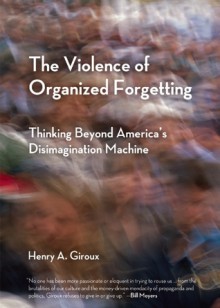
First things first, I would never have ordinarily read this book. A member of my book group had picked it up in the famous City Lights bookshop on a recent visit to San Francisco and decided it would make a good book for the rest of us to read.
Most of the group, including me, are left-leaning liberal types so, before reading it, I imagined this book would be playing to the gallery. And, to an extent, it does. Giroux catalogues America's many ills, all of which are well known to anyone who follows world events, and seen in black and white it is a damning and alarming list: a neoliberal elite systematically disenfranchising the poor, the elderly, the young, people of disputed residency and people of color; America's obsession with violence and guns; mass state surveillance; the war on terror; the large number of citizens residing in prisons; rampant consumerism; assembly line education; job insecurity; increased militarisation; reduced social mobility; the treatment of Edward Snowden; Guantanamo Bay; the shameful aftermath of Hurricane Katrina; and so on.
Giroux writes in a very strident style but one that is also overly intellectual and peppered with jargon. As I read it I wondered who Giroux hopes to reach with this book. Not only did the sociological jargon mean little to me, it is also very repetitive. It's like sitting next to a drunk professor ranting about the state of America. He's clearly very bright and well informed but his points quickly become repetitive, his language incoherent and before long I wanted to make my excuses.
So what exactly is Giroux trying to say? And to whom? Once I'd fought my way (OK, frequently skimmed my way) through the forest of jargon (never explained) and references to numerous other theorists, what is Giroux's solution? In the last chapter Giroux suggests hope. Riiight. Against the backdrop of the powerful elites so painstaking described by Giroux over 280 pages it's hard to see where that's going to get anyone. Indeed Giroux again spends most of the final chapter continuing to rake over America's ills and qualifying why "hope" is so hard to create and maintain.
Shouldn't I have felt angry and inspired by the end of this book? I actually felt depressed, bored and relieved to have finished. A missed opportunity.

 Log in with Facebook
Log in with Facebook 





